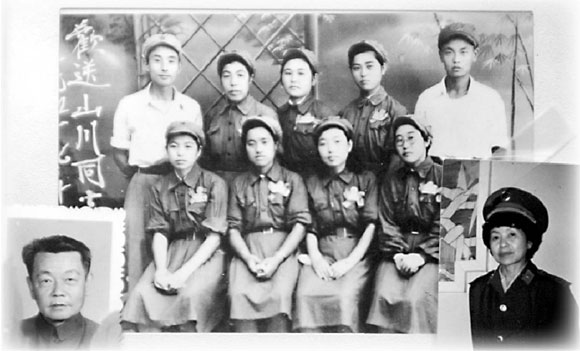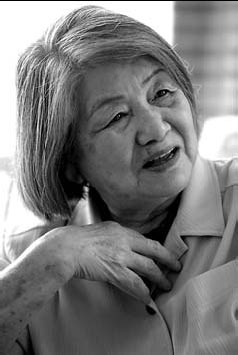Exposing the suffering
|
Yukiko Yamabe collects a few old photos about her life and friends in the PLA. In the main photo of the frame, she (left at the first line) sits with her fellow Japanese nurses. Photos by Guan Xin |
A Chinese soldier knocked over the meal a young Japanese nurse brought to him. "What are you Japanese doing here, you're the losers!" he shouted.
Soon after, a Chinese officer came in, criticized the soldier and forced him to apologize.
The incident happened when Yukiko Yamabe had just joined the Chinese Northeast Democratic Allied Army, which was established in November, 1945 and was considered a former branch of the Chinese People's Liberation Army (PLA). And she still fondly calls the Chinese officer who led her team the "instructor".
It was in the late 1940s, during the War of Liberation (1945-49).
Yamabe was one of the few Japanese still alive to share her life's memories with the PLA in those years. There was no exact figure, but she heard that about 3,000 Japanese joined the PLA at that time, she said, a little known fact in the history of the Chinese military.
"It was natural for the Chinese soldier to misunderstand us at first," says Yamabe, who recently visited Beijing. The Japanese army had occupied almost all of China for eight years and the Northeastern part of the country for even longer.
"As time passed, our (Chinese) comrades gradually accepted us," says Yamabe, who is now 78 years old but looks just like an ordinary Japanese tourist in her 60s.
Yamebe's rare experience with the PLA came about quite by accident.
Yamabe and her mother came to China in 1941 to join her father, who worked at a Japanese mining company in Benxi City, Liaoning Province. Her initial knowledge about the Communist Party of China (CPC) was from everyday Japanese reports.
"I was puzzled why there were so many rebellious 'bandits' despite many being killed," she recalls.
After Japan surrendered in 1945, her mother encountered soldiers from the Red Army of the Soviet Union and the Kuomintang. They were so arrogant, Yamebe recalled her mother complaining.
In sharp contrast, a poorly dressed soldier of the Eighth Route Army came to their house one day to borrow a pot. He was very polite and returned it several days later, along with two carrots. Led by the CPC, the Eighth Route Army was founded during the War of Resistance against Japanese Aggression (1937-45).
Those experiences made Yamabe more interested in the CPC and its army. "I really wanted to know at that time what kind of army the Eighth Route was," Yamabe says. Her curiosity led to her decision to join a medical unit with friends, when the Chinese Northeast Democratic Allied Army recruited temporary nurses in December 1945.
|
Yamabe, 78, cherishes her experiences with the PLA. |
Her parents initially worried about her decision but later agreed. "They had little idea what life would be like for us then. They believed that might be better for me if I joined the army," Yamabe says.
The then 16-year-old girl hadn't expected that her three-month temporary job would stretch into seven years.
After the War of Liberation broke out, Yamabe and her teammates traveled around Dandong and Mudanjiang to tend the wounded and studied medicine during their free time.
All of the 200-plus medical staff in her temporary hospital - now the PLA No 181 Hospital - were Japanese. Yamabe says: "Many of them used to serve in the Japanese army hospital, including my head nurse, who is still alive, living in Chiba City in Japan."
As the battles intensified, Yamabe and her colleagues often tended to more than 100 wounded soldiers a day.
Exhausting work and long separation from family made Yamabe homesick. She often cried when she was alone. "Fortunately, a Chinese cook in his 60s often comforted me by giving me boiled corns. I felt like I was with my father when I was with him."
To ease her homesickness, the head nurse ordered her to take care of a big room full of dying patients. Their painful groans under the dim light at night frightened Yamabe, but she was moved by the head nurse' gentle care for the patients.
The head nurse comforted a patient who lost his legs with half Chinese, half Japanese and gestures, telling him that "you just had an operation on the legs but you will soon recover".
The next day, the young man was weaker and groaned more desperately. With a lack of medicine, Yamabe felt helpless, and she wept a lot, she recalls. "I can still remember him today. He said: 'Little sister, don't cry. I can bear the pain now'," Yamabe says with tears in her eyes. "Can you imagine a dying patient comforting a nurse?"
"When you face people every day who have only several days or several hours to live, you don't care if they are Chinese, Japanese or Korean," Yamabe says. "I wanted to help them so much, but without medicine we could do nothing.
"At that time, I began to understand the meaning of the Chinese War of Liberation. If the country was united, no more people would be killed and we could get medicine to help the patients," she says.
Yamabe says since then she had hoped to win the war as eagerly any other PLA soldier.
When they were not so busy, Yamabe and her teammates often helped nearby peasants grow corn. The Chinese soldiers with slight wounds often helped the Japanese nurses to clean up, boil water or tend to the seriously wounded.
They followed the army as it marched south from Northeast China to northern and eastern part of China. Along the way, they saw with their own eyes the poverty and starvation the Chinese people were suffering. Often a large crowd of skinny and ragged children would surround them when they ate porridge.
"Our instructor told us it was Japanese invasion that brought about the poverty and starvation to a lot of Chinese," Yamabe recalls. His words, along with the children's hunger, forced her to seek the truth.
But it took longer than she'd expected.
In 1952, Yamabe and Kenzo Yamabe, also a Japanese in her hospital, tied the knot. One year later, they received a letter from her father, and then they returned to Japan.
"But I always consider my Chinese comrades as family, and missed the PLA very much," says Yamabe. She returned to China to teach Japanese three times in the 1980s.
From 1990 to 1991, when she studied Chinese at the age of 61 at Heilongjiang University, she happened to know something about China that could be of assistance to academics.
Her dream to seek true history was ignited again, so she applied to go with the Chinese scholars. During the research, she was shocked to see evidence showing that the Unit 731 of the Japanese Imperial Army conducted experiments on Chinese prisoners. She also met "comfort women" who still suffered physically and emotionally, and farmers who were wounded by Japanese mustard bombs.
"I can't understand why there are still so many Japanese who are unaware of what Japan did to Chinese people during the invasion," says Yamabe, who has hosted dozens of exhibitions with other volunteers across Japan to expose the war crimes committed by the Unit 731 of the Japanese Imperial Army.
Despite interference from some right-wing Japanese protesters outside, her exhibitions attracted more than 600,000 Japanese.
"Now, the people I worry about most are the Chinese hurt by the chemical weapons still left in the field. The Japanese government should provide medical services and cover the fees, because the Chinese exposed are likely to suffer from many diseases all their lives," Yamabe says.
"My biggest wish is that the Japanese government can face up to the true history and apologize sincerely to the Chinese people."
(China Daily 09/26/2007 page20)
















